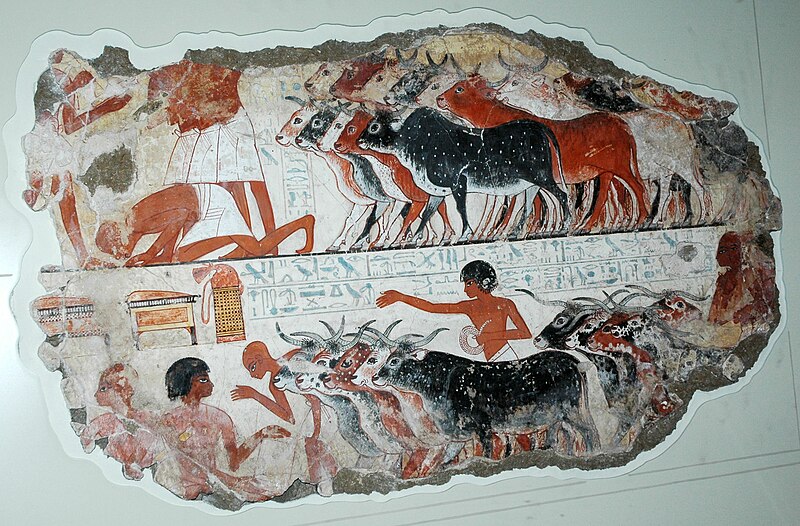There is a theory about Mesopotamian origin of the Hebrews - who later migrated to the Levant and to Caanan. According to this theory the Hebrews came to their ulimate homeland during the so called 3rd wave of Semitic migrations, arriving there, absorbing and mixing with previous Semite-speakers who had migrated or emerged there before.
The Biblical story which says that Abraham was born in the city of Ur is of course a legend and we don't know whether it is true or not (or whether that Abraham really existed or not), but it may reflect the eastern origin of the Hebrews. There are also written sources which seem to support Mesopotamian origins of the Hebrews. One of them mentions the
Habir peoples (could they be Hebrews? most probably yes) living in Mesopotamia, near the city of Ur, ca. 2750 - 2600 BC. Later sources mention such names like
Habiri and
Ibrim (could both or at least one of these names be Hebrews? most likely yes) migrating to Caanan during the 15th century BC, as part of the 3rd wave of Semitic migrations.
Then we have Egyptian sources mentioning some people called the
Hebiri / Habiru (they could be Hebrews) in Egypt during the 13th and the 12th centuries BC. There is little or no archaeological evidence of their presence, but maybe that's because they were a relatively small group (perhaps no more than 35,000) in a country which had a few million inhabitants. Of course they were not building pyramids, because their presence in Egypt took place centuries after the end of "pyramid-building movement" (according to the link posted below, the last of Egyptian pyramids were constructed in the 18th century BC - almost 500 years before the beginning of hypothetical Hebrew presence in Egypt):
http://www.ancientegypt.co.uk/time/explore/pyr.html
On the number of Hebrews in Egypt (most probably no more than 35,000):
http://www.accuracyingenesis.com/exodus_population.html
On the population of Egypt at that time (between 3 million and 5 million people):
http://www.reshafim.org.il/ad/egypt/people/
http://www.ggdc.net/maddison/oriindex.htm
After settling in Canaan, the Hebrews mixed with local peoples - other Semitic tribes who had been there before them (the Hebrews first visited Palestine around 3500 years ago, and ~3300 years ago they maybe went to Egypt, just to come back to Palestine between some 3100 to 3050 years ago).
The Bible gives examples of ethnic mixing - grandmother of King David was an ethnic Moabite. So when Jews emerged as a true nation (and they emerged as such perhaps only in their own kingdom* - established in year 1020 BC), they were no longer descendants of just the Hebrews alone. They also assimilated or absorbed many other Semitic tribes.
*Though already before establishing a kingdom (1020 BC), Jews had been a loosely united tribal union. It consisted of many tribes, both with Hebrew and other Semitic, Non-Hebrew background:
http://en.wikipedia.org/wiki/Book_of_Judges#Main_text
Among those tribes absorbed by the Hebrews - and thus taking part in the ethnogenesis of the Israelites / Jews - were for example the Kenites, the Rechabites, the Kenisites, etc. They also intermarried with the Edomites, the Moabites, etc. Perhaps some ethnic Egyptians also melted into Jewish communities, if the story about Hebrew presence in Egypt is true. And Moses even had an Ethiopian wife (allegedly). Only centuries later Jewish laws concerning marriages of Jews with Non-Jews became much more restricted, but that still did not stop the influx of new blood when Gentiles converted to Judaism (like apparently many Ancient Greeks did during Hellenistic and Roman times). And already before the Roman subjugation of the Hasmonean Kingdom, Jews had been the result of a mix of many tribes.
So ethnogenesis of Jews "proper", or the Israelites, took place in Canaan, even though one of major parts of their ancestors - the Hebrews - might have migrated there from the east. As for the Hebrew language - it belongs to Canaanite subdivision of Semitic, which included for example Hebrew and Phoenician. Canaanite languages - together with Aramaic, Ugaritic and Amorite subdivisions - were parts of Northwest Semitic languages, which were parts of Central Semitic languages. Amorites had migrated to Western Levant before the Hebrews and founderd the Kingdom of Yamhad:
http://en.wikipedia.org/wiki/Yamhad
http://en.wikipedia.org/wiki/Semitic_people#Semitic-speaking_peoples
As for Judaism in its modern form, as a monotheistic religion - Judaism evolved from Canaanite religion, but at the beginning they most probably worshipped many gods. It evolved from Polytheism through Monolatrism (recognizing the existence of many gods but believing that only one is the chosen god worth worshipping) to Monotheism.
Indeed the Samaritans were part of the same ethnic group as the Jews - they were both ethnic Israelites, but the Samaritans had their own non-orthodox sect of Judaism. Apart from the Israelites (including Jews and Samaritans), also other ethnic groups inhabited the area of modern Israel and Palestine in Ancient times - including the Philistines, who could be ancestors of modern Palestinian Arabs (apart of course from "original Arabic" and other admixtures into them):
Area with ethnic Jewish / Israelite majority in Ancient Caanan (light green):
Israelite religious sites in Caanan / Palestine during the early period of Roman rule:
The 2nd map is based on archaeological findings and written sources, according to The Cambridge History of Judaism.
============================
Jewish people have a tragic, but great and very ancient history. As this study shows they also share the heritage of Ancient Greeks and Romans as they are partially (35%) descended from those of them who converted to Judaism.






